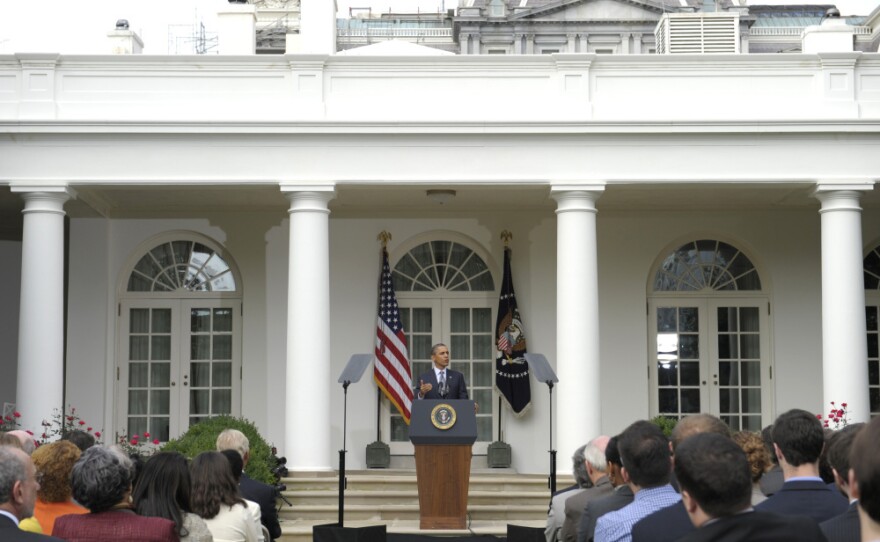President Obama's re-election may all come down to whether voters mainly view the 2012 race seen as a referendum on his presidency or a choice between competing Democratic and Republican prescriptions for how to best address the nation's economic and fiscal challenges.
If it's a referendum, it could well be curtains for his hopes of a second term because the economy is clearly making too many voters unhappy and scared.
But if it's a choice, Obama could win by persuading enough voters that his preferred approach, with its balance of spending cuts and higher taxes on the wealthy, is closer to their values.
Thus, the president's $3 trillion deficit reduction plan announced Monday, his administration's recommendations to the congressional super committee, is aimed at framing the 2012 election as a choice.
Obama's argument is that while he wants the same as most Americans based on polling, Republicans would let the burden of deficit reduction fall on the poor and middle class and oppose any effort to raise taxes on millionaires, billionaires and corporations.
The choice comes down to which side of the "Warren Buffett Rule" line one stands on.
As the billionaire investor Buffett has repeatedly and famously observed, because of tax breaks available to the superwealthy, his effective tax rate is lower than his secretary's. Both Buffett and Obama think that's monumentally unfair. And Obama is betting that most voters will see it that way, too.
In a speech from the White House Rose Garden Monday, Obama made clear that he intends to keep Republicans on the defensive over a tax code biased towards the superwealthy, a code under which middle-income taxpayers are faced with tax rates of 23 percent to 33 percent while superwealthy hedge fund managers can have rates of 15 percent.
OBAMA: It is wrong that in the United States of America, a teacher or a nurse or a construction worker who earns $50,000 should pay higher tax rates than somebody pulling in $50 million. Anybody who says we can't change the tax code to correct that, anyone who has signed some pledge to protect every single tax loophole so long as they live, they should be called out. They should have to defend that unfairness. Explain why somebody who's making $50 million a year in the financial markets should be paying 15 percent on their taxes when a teacher making $50,000 a year is paying more than that, paying a higher rate.
They ought to have to answer for that.
And if they're pledged to keep that kind of unfairness in place, they should remember — the last time I checked, the only pledge that really matters is the pledge we take to uphold the Constitution.
It was an allusion to anti-tax activist Grover Norquist's pledge, signed by virtually all congressional Republicans and some Democrats, against increasing tax rates or reducing deductions.
Obama was making it clear to Republicans that he had his own version of the "You're either with us or against us" statement invoked during the previous administration. However, he was would be using it on fiscal and economic, not national security, matters.
"Us" in this case refers to most voters who aren't superwealthy and those among the highest earners, like Buffett, who want higher rates for those who get much of their income from capital gains instead of wages.
In response to Republican criticisms that what he advocated amounted to class warfare, Obama used a line he has employed before and will likely use much more in the months to come.
"It's not class warfare. It's math," he said. His point: that if the rich aren't made to pay more, deficit reduction will come mainly from cutting spending on programs lower and middle income Americans rely on, like entitlements and education spending.
Speaker John Boehner didn't disappoint Obama.
BOEHNER: "Pitting one group of Americans against another is not leadership."
In other words, Boehner played the class-warfare card without using the phrase.
By positioning himself as the protector of lower and middle class voters and tax payers, Obama gives a Democratic Party base that has been disappointed in him, a new reason to rally behind him.
He advanced that goal by warning Republicans that he would veto any effort to reduce deficits and the national debt that cut Medicare spending without raising any taxes on the rich.
OBAMA: And I will veto any bill that changes benefits for those who rely on Medicare but does not raise serious revenues by asking the wealthiest Americans or biggest corporations to pay their fair share.
Obama's proposals have little to no chance of being passed in their entirety. But that's not the point. Along with the jobs bill he introduced last week, the deficit-reduction plan was an opportunity to frame the political debate for the 2012 general election.
If Obama has anything to say about it, whoever becomes the Republican presidential nominee, and Republican congressional candidates, will have to explain to voters why the wealthiest Americans shouldn't pay taxes at rates that are at least as high as those paid by the middle class.
The president is betting he'll have the better of that argument,especially since, again, polls suggest a substantial majority of Americans agree with him. If 2012 is to be a referendum, he plans to make it not on him but on the rich and their taxes.
Copyright 2022 NPR. To see more, visit https://www.npr.org. 9(MDAzMjM2NDYzMDEyMzc1Njk5NjAxNzY3OQ001))







